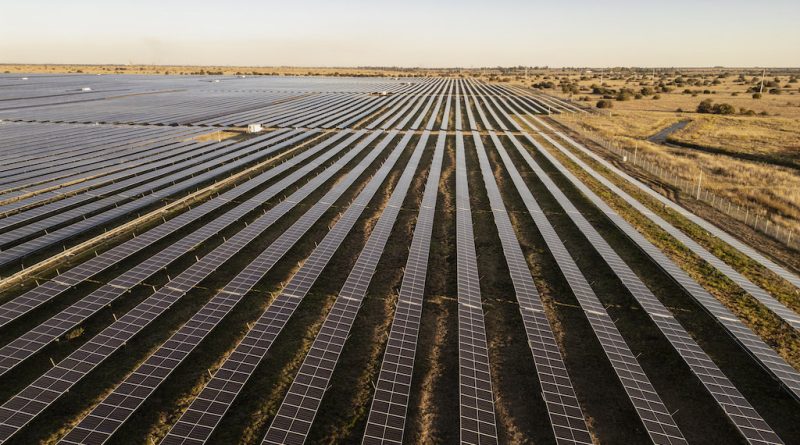Vodacom Launches Virtual Wheeling Platform
Organizations with multiple locations across the nation can now tap into renewable energy, thanks to the virtual wheeling platform launched by Vodacom.
In collaboration with Eskom to supply green energy for its operations, Vodacom describes this platform as a major leap in reshaping the local electricity supply landscape.
Read: Renewables to meet 30% of Vodacom SA’s energy needs [Oct 2023]
Wheeling does not involve the physical movement of electrons through the electrical grid. Similar to water droplets, electrons are indistinguishable from one another, akin to filling a dam at one site and extracting water from another. A calculation is necessary to equate the quantity of electrons received by the purchaser at an agreed price, along with the payments made. Credits are provided to prevent double payments.
Historically, these transactions, which take place globally, were conducted between a single independent power producer (IPP)—like a solar farm in the Northern Cape—and a solitary consumer, such as a mine situated in Limpopo. Eskom, as the owner of the transmission network, and, if needed, the municipality utilizing its distribution network, plays a role in the transaction.
Read: Eskom enters land lease agreements with renewable investors [Oct 2022]
This arrangement, however, rendered green energy inaccessible for firms like Vodacom, which has 15,000 low-voltage sites spread across 168 municipalities nationwide.
ADVERTISEMENT
CONTINUE READING BELOW
To reduce Vodacom’s carbon footprint through renewable energy, its subsidiary Mezzanine has been working with Eskom since 2023 to build a virtual platform capable of intricate reconciliations, allowing its sites throughout the nation to benefit from solar power sourced from the Sola Group’s solar farm near Springbok, Northern Cape.
After a testing period, the platform—equipped with smart metering—is now fully operational.
According to Vodacom SA CEO Sitho Mdlalose, the transaction involves several agreements:
- A virtual wheeling agreement between Vodacom and Eskom;
- A power purchase agreement (PPA) with the Sola Group, which produces the energy;
- A virtual platform agreement with its subsidiary Mezzanine for utilizing the platform, ensuring alignment with Eskom’s guidelines. This includes providing data on power usage within Eskom’s specified time slots, where different tariffs apply (time-of-use).
The process of the transaction unfolds as follows:
- Vodacom compensates the Sola Group for every unit of energy consumed, according to the PPA;
- Vodacom continues to make payments to its electricity supplier—whether Eskom or the local municipality—for the energy consumed at its sites;
- Vodacom receives a reimbursement from Eskom for the energy generated by the Sola Group and utilized at Vodacom sites, calculated based on time-of-use;
- Vodacom pays Mezzanine a portion of the refund from Eskom for utilizing the platform, which reconciles power production and consumption across all Vodacom sites on a monthly basis, ensuring it aligns with Eskom’s data. This process is semi-automated as Eskom updates its systems.
Vodacom is optimistic that this initiative opens pathways for other companies with similar needs to access green energy as well.
Mdlalose expressed that the company takes great pride in the innovation introduced by this platform. It holds major significance for the future of the nation’s energy and redefines the landscape for companies with distributed operations like Vodacom.
“More importantly, this achievement highlights our commitment to a sustainable future—one where we protect the planet, expedite the adoption of renewable energy, and enhance the stability of the national grid,” Mdlalose remarked.
ADVERTISEMENT:
CONTINUE READING BELOW
This solution enables companies to cut costs, contribute to reducing greenhouse gas emissions, bolster the stability of the national electricity grid, and create jobs within the local energy sector, he added.
“The extra renewable energy integrated into the grid aids in alleviating load shedding, ensuring consumers enjoy a more consistent supply while mitigating the impacts of climate change,” Mdlalose pointed out.
Wheeling is a crucial part of Vodacom’s plan to achieve net-zero carbon emissions by 2035. Therefore, Vodacom continues to invest in energy efficiency programs and innovative green energy solutions.
Read:
African financiers commit $100bn for green initiatives
Vodacom eyes Africa network sharing as payout surpasses expectations
Simon Haw, founder and chair of the Sola Group, stated that virtual wheeling marks a significant moment in South Africa’s energy transition.
“We take pride in being the IPP in Vodacom’s first agreement of this nature. By providing large, decentralized businesses access to our renewable energy at scale and at lower costs, this innovation not only reduces their carbon footprints but also accelerates the shift to a cleaner, more resilient energy system,” Haw affirmed.
Follow Moneyweb’s extensive finance and business news on WhatsApp here.

